Paedophiles, lures and susceptible children: the UK tabloids take on Pokémon Go
"Is this the world's most dangerous game?"
The UK's newspapers, amid the maelstrom of the biggest political turmoil of modern times, have found a page or two to take on new mobile phenomenon Pokémon Go.
The papers that ask the toughest questions of the augmented reality game are those you'd expect: The Daily Mail and The Daily Telegraph each carry headlines that cast Pokémon Go in a worrying light.
Pokémon Go encourages players to hunt down imaginary critters located out in the real world. By exploring further you can discover new species and battle other players - and it's this social aspect of the game that has raised the collective eyebrow of news editors across the land.
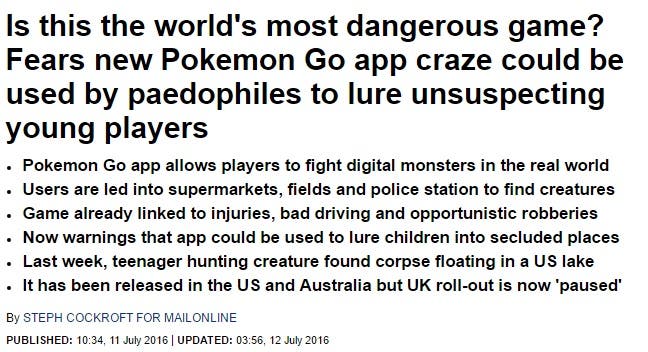
"Is this the world's most dangerous game?" The Mail's headline wonders.
"Fears new Pokémon Go app craze could be used by paedophiles to lure unsuspecting young players," it continues.
The Mail points out that Pokémon Go has been linked to injuries, bad driving and opportunistic robberies.
But it also suggests Pokémon Go could be used by paedophiles to "trap" distracted children.
"But, more worryingly, there are now claims that the app could be used for something more sinister altogether - such as paedophiles using the 'lure' element of the game to trap distracted children," the paper reports.
Pokémon Go's lure feature, which we reported on yesterday, works, as you might expect, by attracting critters around your local area.
You can pay for lures yourself with in-game cash or via Pokémon Go's microtransactions. Alternatively, you can hang around while someone else nearby does the same. The Pokémon that spawn around the lure are visible to all players.
The Mail quotes the tweets of one person who expressed concern about the mechanic on the social media website. It also quotes the NSPCC, whose statement tallies with The Mail's angle.
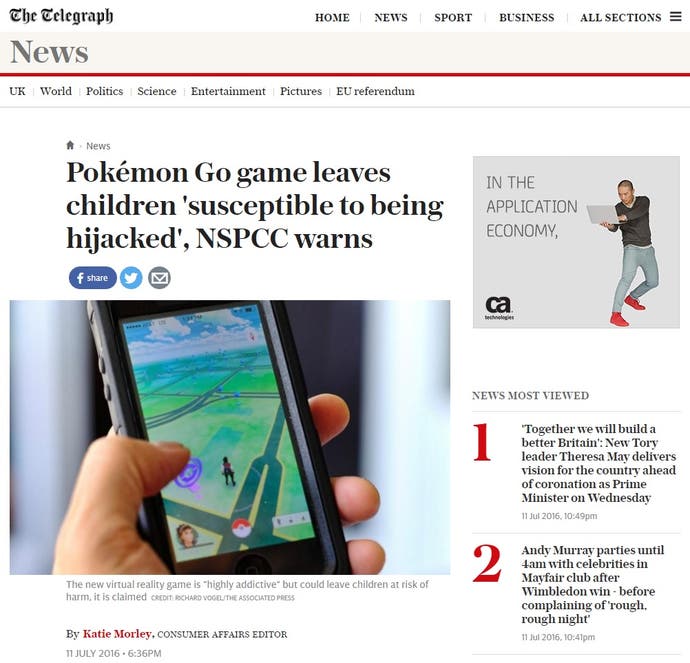
Here's the statement:
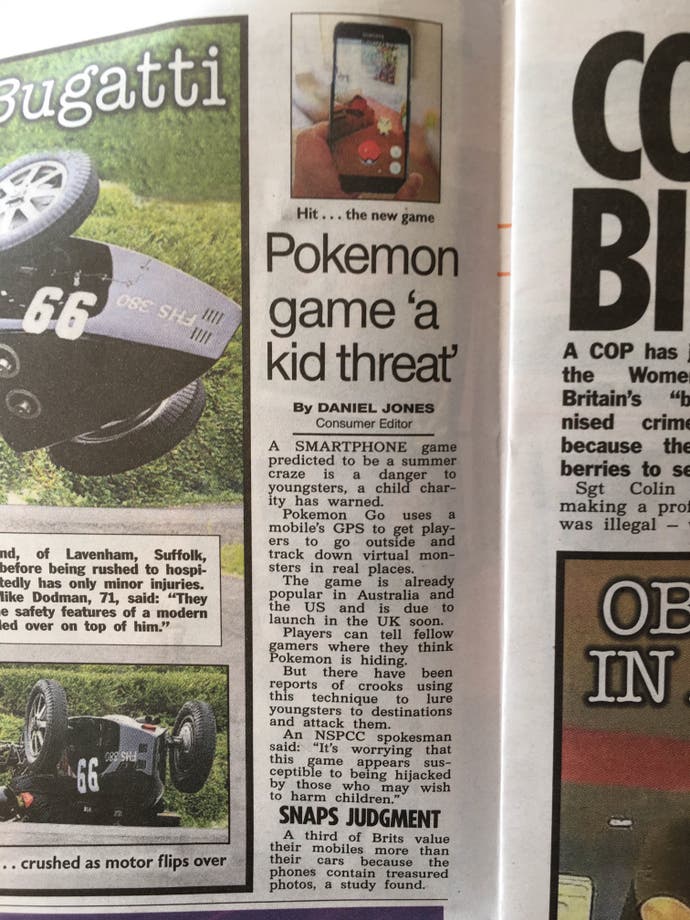
It's this NSPCC statement that The Daily Telegraph bases its coverage upon. It carries the headline: "Pokémon Go game leaves children 'susceptible to being hijacked', NSPCC warns."
The paper claims Pokémon Go "poses a serious threat to youngsters' safety", and includes a box-out listing the risks of Pokémon Go. One mentions paedophiles.
Elsewhere, The Sun relegates the Pokémon Go story to a news-in-brief item on page 18, which carries the headline: "Pokemon game 'a kid threat'." The story is based on the same NSPCC statement.
Meanwhile, The Times claims gamers have been "duped into virtual danger zone".
The paper reports on "rather strange goings-on" that have occurred as a result of Pokémon Go's social gameplay. It mentions the story of three men from Missouri who were charged with armed robbery on Sunday night after police said they had used the game to entrap victims. There's no mention of paedophiles in The Times' report, rather, it focuses on the physical dangers posed by the game.
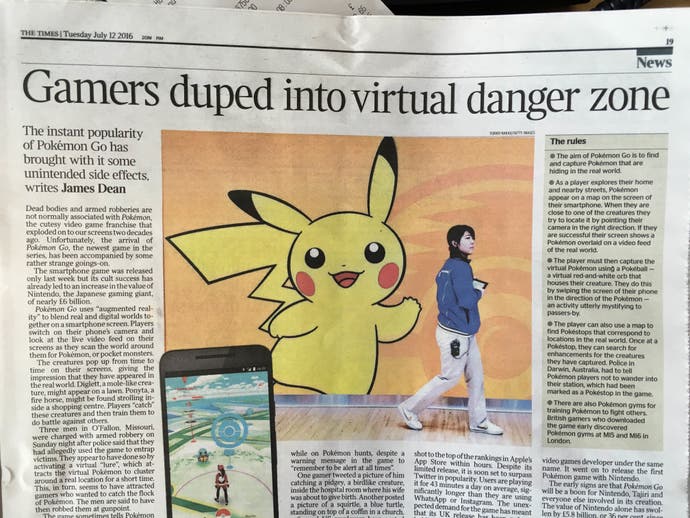
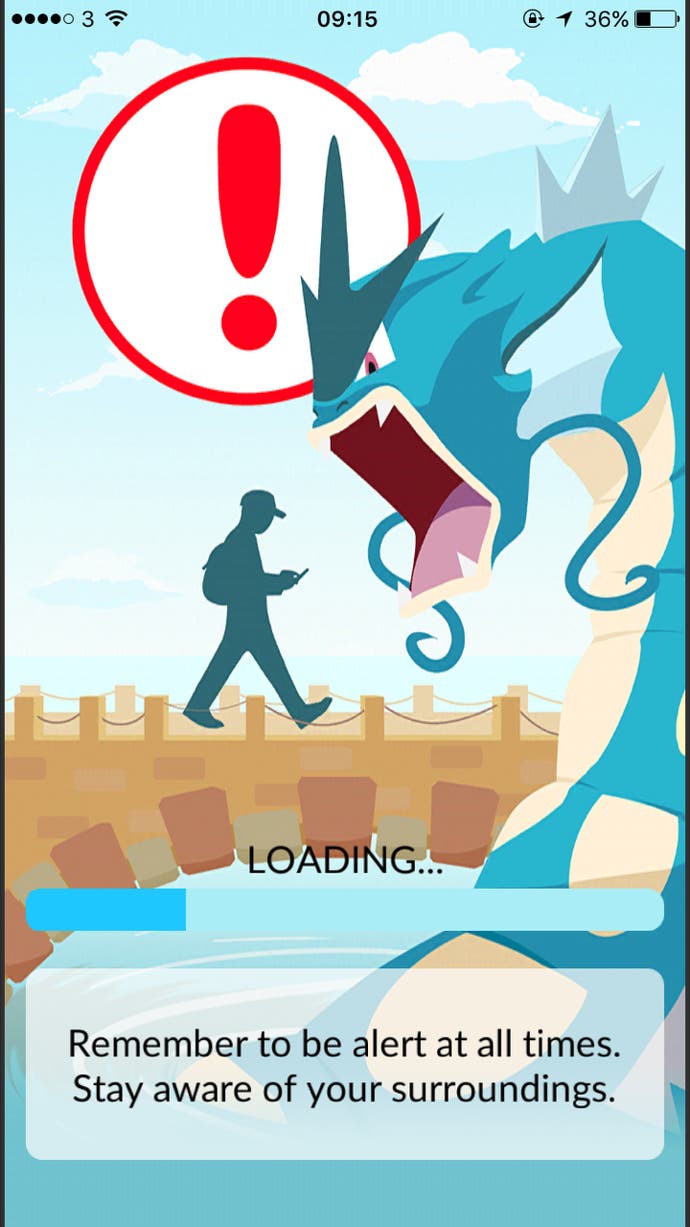
The Mirror takes a surprisingly positive approach, saying Pokémon Go's unexpected side effects are "great news for players". It focuses on the exercise players are enjoying as a result of chasing down Pokémon out in the real world.
"Video games, rightly or wrongly, are often associated with laziness - someone tucked away in their room, curtains drawn and surrounded by empty pizza boxes," The Mirror says.
"But Pokémon Go seems to be reinventing the way people view gaming."
The Express warns Pokémon Go players about hackers who are trying to trick users with an infected version of the app. The Express reports that with just a few adjustments in the phone's settings, Android users can grab the game from the ApkMirror ahead of the official release in the UK. But, the paper warns, doing so carries "a major security risk".
And finally, The Guardian takes a leaf out of the specialist games press' book and covers Pokémon Go with the likes of a starter guide for new players, an "everything you need to know" guide, and a feature that suggests it's kind of like a religion.
Of course, Pokémon Go itself warns users to always pay attention to their real-life surroundings when playing the game with an in-game message that pops up every time the game boots.
Playing Pokémon Go? Check out our Pokémon Go guide and beginner's tips to get the most out of finding Pokémon, catching them and leveling up.


















